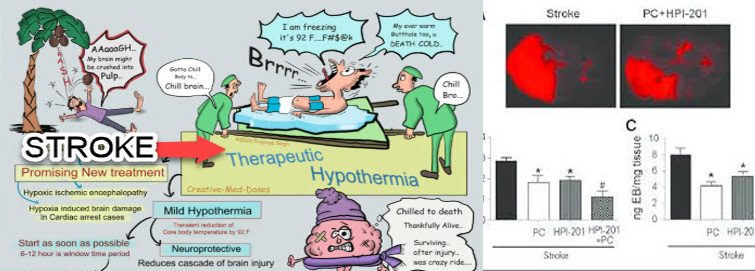Readers of these news pages who are professionals in stroke or stroke survivors and their loved ones know the mantra ‘time is brain’ better than anyone. Rapid intervention is crucial to minimise damage, but current treatments have a limited time window, so researchers have been working on a ground-breaking new drug treatment for stroke survivors to widen this window that actually induces hypothermia; basically putting the brain in a state of suspended animation or hibernation to protect it from damage.
Therapeutic hypothermia, or controlled cooling of the body, is a powerful neuroprotective strategy that has shown immense promise in preclinical studies for reducing damage after an ischemic stroke. The science is compelling: lowering the brain’s temperature slows down its metabolic rate, reduces inflammation, and prevents a cascade of cellular death. The major challenge, however, has been practical clinical application. Traditional physical cooling methods, such as cooling blankets or intravascular catheters, are often slow, inefficient and can cause adverse side effects like severe shivering, which is counterproductive as it generates heat and stress.
This is where the new pharmacological approach changes the game. Researchers are focusing on creating drugs that can act directly on the brain’s ‘thermostat’ in the hypothalamus to lower the core body temperature in a controlled and rapid manner, critically without triggering the body’s natural shivering response.
One of the most promising compounds studied in this field is known as ABS-201 (also referred to as HPI-201), a novel neurotensin receptor 1 (NTR1) agonist. This drug is designed to cross the blood-brain barrier and target specific receptors, effectively ‘resetting’ the body’s temperature set point. Preclinical studies have shown that a single dose of ABS-201 can reduce body and brain temperature by 2–5°C within minutes, a level of mild to moderate hypothermia that offers significant neuroprotection. The potential impact is huge: animal studies have demonstrated up to a 30-40% reduction in infarct volume (the area of dead tissue) and improved long-term functional recovery when the treatment is administered even hours after stroke onset.
This pioneering research has been published in esteemed academic journals such as Stroke and PLOS Medicine. Key researchers in the field, including teams from institutions like the University of California, San Diego (UCSD) and others in Australia and Europe, have been instrumental in these findings. Their work suggests that a pharmacological approach could be a powerful stand-alone treatment or a synergistic aid to current physical cooling methods, making hypothermia therapy much more feasible for a wider range of patients in due course.



